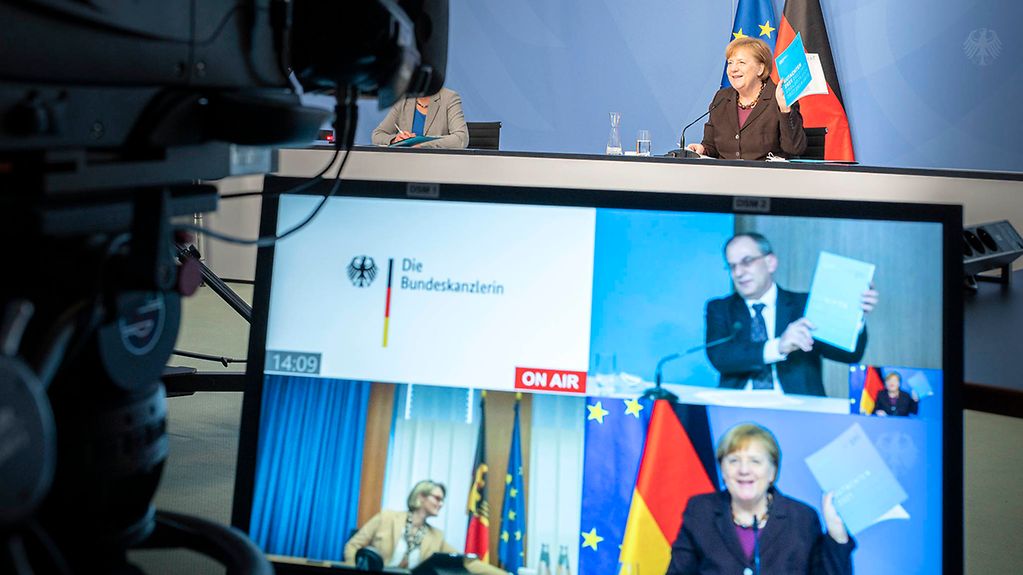Annual Report Research and Innovation
“A fantastic treasure trove for us and our future work.” That was how the Federal Chancellor described the Annual Report of the Commission of Experts for Research and Innovation which she was presented with today. The coronavirus crisis had to be used to push ahead with important future issues even more resolutely, she said. And speed was also of the essence.
4 min reading time

In times of the pandemic expert reports, too, are presented digitally
Photo: Bundesregierung/Bergmann
Digitalisation and climate action are elementary future issues, Federal Chancellor Angela Merkel emphasised when the 2021 Annual Report of the Commission of Experts for Research and Innovation (EFI) was presented to her. In order to come out stronger after the end of coronavirus crisis and to drive forward innovation the Federal Government will be using 60 billion euros of its economic stimulus and innovation programme as a “package for the future”.
Artificial intelligence, hydrogen and quantum technology
Besides digitalisation and climate action, the Federal Government was above all interested in artificial intelligence (AI) and in hydrogen and quantum technology, Angela Merkel said. She made the point that “speed is also of the essence, money needs to be spent as quickly as possible not in a few years’ time”.
Wise policies have opened up scope for action
The Chair of the EFI, Prof Dr Uwe Cantner from the University of Jena, drew attention to the fact that Germany’s research and innovation policy faced huge challenges – “and that regardless of the coronavirus crisis”. At the same time, he said, Germany was well placed to meet these challenges: “The wise economic and financial policy adopted over the last two decades has opened up scope for action which can be used to correct big economic imbalances, to be able to quickly borrow money during the coronavirus pandemic and also opens up big future investment potential.”
Raising Germany’s innovation profile
Prof Cantner made it clear that quite a lot had been done recently to get important technologies of the future underway. Now great emphasis needed to be placed on driving that work forward, he added. The EFI welcomed the fact that the Federal Government was providing substantial support to areas such as AI and hydrogen and quantum technology, Cantner said. This was key “to further raising Germany’s profile,” he added, given that it was only one of a group of key global locations for innovation.
The Commission of Experts for Research and Innovation (EFI), founded in 2008 and headquartered in Berlin, provides the Federal Government with scientific policy advice and presents an Annual Report on research, innovation and technological productivity in Germany.
Experts recommend five priorities
The Commission of Experts recommends that the Federal Government align its future R&I policy to five key priorities. Accordingly, high priority needs to be given to the big challenges society is facing and, in particular, to the sustainability goals. What is also important when it comes to developing prosperity is that Germany needs to fill its current technological gaps and to avoid these opening up at the outset in potential key technologies.
To be able to achieve these goals, the EFI recommends that a country like Germany, which is poor in natural resources, needs to have a large skilled worker base. With regard to investment by private companies, it is also necessary that they increase their level of participation in innovation. And, finally, the agility of R&I policy is a key prerequisite for successfully implementing the transformative change desired by society.
Germany approaching 3.5 per cent target
According to preliminary calculations by the Federal Statistical Office, Germany spent 109.5 billion euros on R&D in 2019. R&D thus made up a share of 3.17 per cent of its gross domestic product (GDP).
Germany has thus once again exceeded the target set under the European Union’s “Europe 2020” growth strategy, namely that R&D make up an least 3 per cent share of GDP. This was down to the “joint success of private-sector R&D and the government’s broad-based funding policy,” the Chair of the EFI stressed.
R&D spending rose by 72 per cent
Between 2009 and 2019 the Federal Government increased its R&D spending by a total of 72 per cent, said Angela Merkel. In recent years Germany had steadily approached the target set by the Federal Government – R&D is to make up a 3.5 per cent share of GDP by 2025 – by increasing R&D spending from 2.9 per cent in 2014 to 3.2 per cent in 2019.
“We know we’ve been quite good at a number of things,” the Federal Chancellor said. But in view of the momentum in some other countries “quite good” did not go far enough. Because, Merkel added, then “you realise that you can’t do enough to act more decisively and more quickly when necessary.”